NO APOLOGY WILL MAKE UP FOR WHAT YOU SAID, OR WHAT YOU HAVE DONE! Since WHEN is a "small comment" an excuse to BULLY, INSULT AND try to SHAME another? Would you call it a "small comment" if they said that the hogs would like the food you cooked? Or the roaches would have a nice time living in your accomodating house? You would make A HUGE SCENE, and you know it. HOW DARE YOU HURT ANYONE ELSE IN THE NAME OF "MAKING A JOKE"? I pray that you never get the opportunity to hurt her or anyone else again. Like maybe GRANDCHILDREN. You are pathetic and you need to ask God for forgiveness and maybe someday you can ask for it from your DIL and SON, but I would not be surprised if they tell you to FUCK off. They are much kinder than that, though. Maybe you should take lessons from them.
I Made an Innocent Comment About My DIL’s Weight—Now My Family Won’t Speak to Me
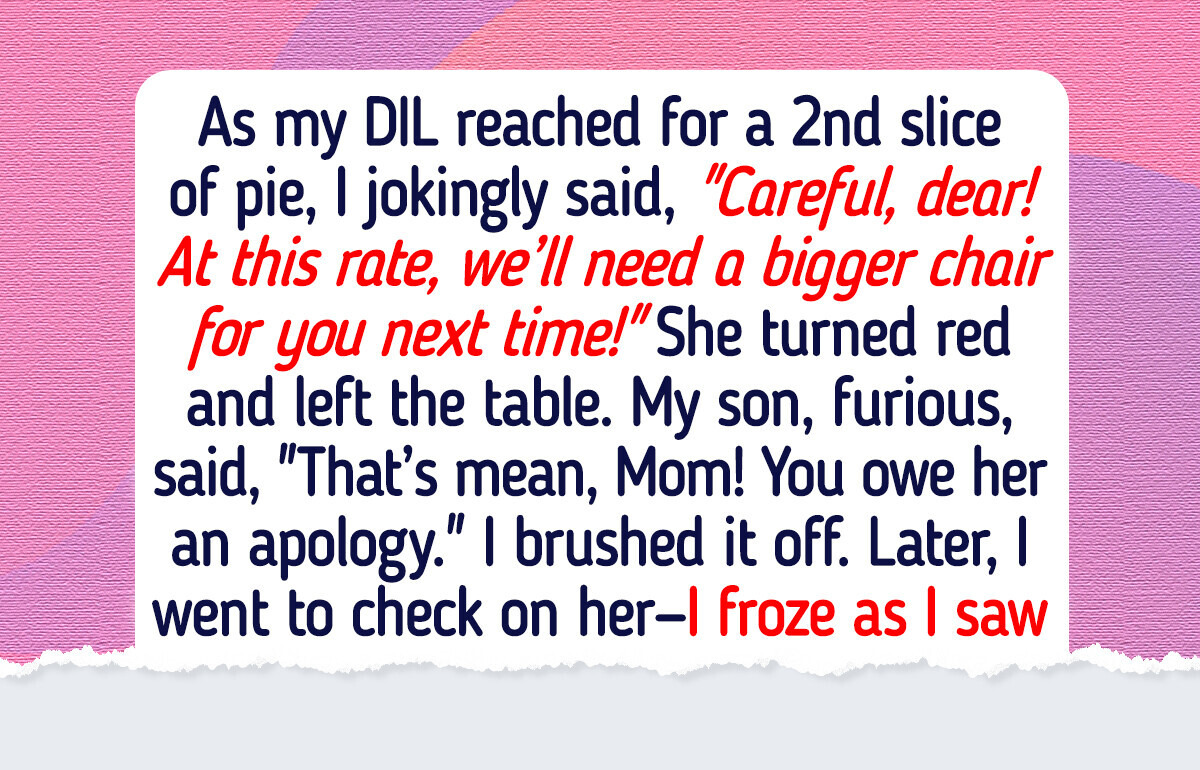
Family gatherings should bring joy, laughter, and togetherness—but sometimes, one thoughtless comment is all it takes to unravel everything. For one woman, a family dinner ended in tears after a simple remark sparked a painful fallout. Her story is a powerful reminder of how words, even when unintentional, can deeply hurt.

Here’s Joy’s Letter:
Hi Bright Side,
Every couple of months, I host a big family dinner. I handle the cooking, the decor, and all the little details—it’s something I take real pride in. This year was no different, and I was quite pleased with how beautifully everything came together.
My daughter-in-law, Carla, has always been a bit... sensitive. She’s a lovely person, don’t get me wrong, but not someone who takes teasing lightly.
While we were enjoying dessert, I noticed Carla helping herself to a second slice of pie. Hoping to keep things light-hearted, I laughed and said, “Careful, honey. At this rate, we’ll need a bigger chair for you next time!” figured it was a playful jab, nothing serious.
But Carla immediately flushed and, without saying a word, stood up and left the table. My son, Joe, looked at me with anger in his eyes and snapped, “That was mean, Mom! You owe her an apology!”
I brushed it off, insisting she was overreacting. After all, it was just a joke, wasn’t it? But the mood shifted. Conversation died down, and what had been a joyful dinner turned tense and quiet. My son barely looked at me and eventually left the table himself.
Later that evening, I heard the front door slam. At first, I still thought Carla was making too much of a small comment. I went to check on her, thinking I’d say sorry just to calm the waters. But when I walked into the room, what I saw made my heart stop.

I froze as I saw her sitting on the edge of the bed, silently packing her suitcase. Clothes lay strewn across the room, and though her expression was pale, it radiated resolve. “Carla, what are you doing?” I asked, completely taken aback. She didn’t answer right away. Her hands kept folding and stuffing garments into the bag. Finally, without meeting my gaze, she said, “I’m leaving.” Her voice was shaking, but her tone left no room for doubt. “Leaving? Now? Where would you even go?” I tried to laugh, hoping to lighten the mood, but even to my own ears, I sounded unsure.
That’s when she turned and looked at me. The hurt in her eyes hit me like a blow.
“You really don’t see it, do you? The snide remarks about my weight, my food. It’s always something with you. Joe keeps saying you mean well, but tonight? I’m done. I’m tired of pretending this is okay.” I stood frozen, completely lost for words. Part of me wanted to tell her she was being dramatic, that it wasn’t such a big deal—but nothing came out. I could only watch as she zipped her suitcase and brushed past me without a second glance.
Joe arrived moments later, furious. “This is your fault,” he snapped. “She’s my wife, and you’ve embarrassed her for the last time. If she’s going, I’m going to.” I pleaded with him to stay, to try and talk things through, but he wouldn’t hear it. He followed her out the door, leaving me behind with the sound of it slamming shut echoing in my chest.
Now I’m sitting here, going over every moment, wondering—was it really that bad? Should I have said sorry sooner? It feels like my family just fell apart over one offhand comment... but maybe I’ve been blind to something bigger all along.
Sincerely,
Joy

You're horrible. You know your DIL is a sensitive person and honestly there's nothing wrong with being a sensitive person. The fact you know that about her, choose to poke fun at her; obviously not the first time, and have the audacity to say/think she's overreacting shows how much you don't respect her or your son. Sounds and looks like YOU need to be MORE sensitive because you don't treat people like that. You obviously don't feel any remorse for your actions still blaming your DIL and I honestly hope your son and especially your DIL go low/no contact because you're toxic and I wouldn't want you to be in the grandbabies lives once they have any if they choose to
Thank you, Joy, for trusting us with your story. We’ve put together four thoughtful pieces of advice to help you navigate this situation as smoothly as possible.
Seeing the Bigger Picture Behind the Moment
Your DIL’s decision to pack up and leave suggests a deeper history of feeling dismissed or criticized. Your repeated comments about her weight, cooking, or career may have chipped away at her sense of acceptance over time. When these moments accumulate, they can lead to lasting feelings of exclusion and hurt. It’s easy to label such reactions as overly sensitive, but they often reflect a deeper emotional build-up. Taking time to reflect on past conversations—especially ones framed as jokes—can offer clarity. The goal isn’t blame, but awareness. Recognizing these patterns shows emotional maturity and a willingness to create a space where every family member feels heard and respected.

In front of everyone? At a dinner party, what do you think she felt? What do you think she think what other thaught about her when you said those cruel words? Do you think it will help to apologize, no, it wont, the damage is done. You better think twize before you open your mouth. Is this what you are going to contiue doing? What about if they got kids, are you going to shame her in front of them too? Are you going to shame them too. I wonder what other things you have said to her, since it seems like this is a pattern from you! To make her shrimp into something you want her to be. Here is s thing, you should never talk like this, not when it is only the two of you or together with others. So this: there are things you can joke about when there are only you, your son and doughter in law, but never in front of someone else. But to joke about her weight are banned no matter if there are only you two either! Shame on you and it is not just to say you are sorry and then everything is okey, you can never go back to how it was, you are going to consult a therapist to understand why you act like that. I know, I told my mom I couldnt visit them anymore because of how my dad treathed me, I didnt want my kid see how disrespectful he was to me!
Why What You Say Matters More Than You Think
Words matter—especially within families. In close-knit settings, even casual remarks can carry unexpected weight. Your comment about Carla’s appearance may have felt like a lighthearted joke, but to her, it echoed a pattern of feeling judged. In family dynamics, words hold the power to heal or harm. Humor can build bridges—but when it touches sensitive topics like body image, it can just as easily create distance. Carla’s reaction suggests this wasn’t a one-time slip. It’s a reminder that strong relationships rely on empathy and mutual respect. Even in everyday moments, what we say can leave a lasting impact.
When Humor Hurts More Than It Heals
We understand—humor often helps keep family dynamics light and fun. But, Joy, when jokes touch on sensitive subjects like body image, they can do more harm than good. Carla’s weight is a personal matter, and even a playful remark can feel intrusive or embarrassing, especially in a group setting. Put yourself in her shoes—would that comment feel like affection or a spotlight on something you’re already self-conscious about? For Carla, it may have felt like a public callout rather than a lighthearted tease.
As the family’s matriarch, you help set the emotional tone. It’s worth asking: Was that moment of laughter worth the hurt it caused? Recognizing the boundary between gentle humor and personal discomfort can make all the difference in creating a home where everyone feels safe, respected, and genuinely valued.

How Apologies Open the Door to Healing
Joe’s call for an apology wasn’t just an attempt to ease the moment—it was a request to acknowledge Carla’s hurt in the moment it mattered most. A sincere apology can serve as a turning point when relationships are strained. It’s not just about saying “sorry,” but about recognizing someone’s feelings and showing a willingness to grow. By brushing him off, the pain likely deepened—for both Carla and Joe—as it may have felt like their emotions weren’t being taken seriously. But it’s not too late. Reach out with honesty and care. Let them know you regret not just the comment, but the pattern Carla described. Show that you’re listening—and ready to do better.
Restoring Bonds and Healing Wounds
Healing takes time and intention. Begin by rethinking how you connect with Carla moving forward. Shift from playful criticism to sincere appreciation. Acknowledge her strengths and make sure she knows she’s a valued part of the family. Strong relationships thrive in spaces built on trust and encouragement. Create room for honest conversations where concerns can be voiced without fear of judgment. This doesn’t mean changing who you are—it simply means using your humor and words in ways that uplift rather than unintentionally wound.
Even small acts of kindness can make a big difference—a thoughtful message, a shared activity, or simply being more present in conversations. Rebuilding trust is possible, but it takes steady effort and a willingness to honor each other’s emotional boundaries.

Family dynamics can bring both joy and challenges—especially when it comes to meeting your significant other’s relatives. One of our readers recently opened up about how her future mother-in-law humiliated her in front of others... but she didn’t let it slide. She turned the situation around in a way her MIL won’t soon forget. Read her story here.
Comments
Related Reads
I Refused to Help My Sister When She Got Sick and I Don’t Feel Guilty About It
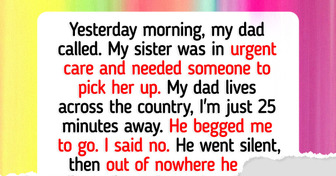
18 People Who Found Out That Small Acts of Kindness Are the Pathway to Happiness
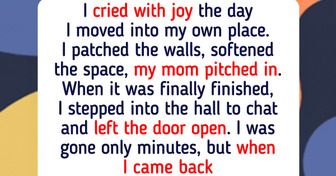
18 Stories That Prove Your Gut Feeling Is Actually a Superpower You Shouldn’t Ignore
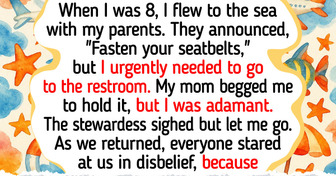
15+ Stories Proving That Hiring a Repairman Is Always a Total Lottery
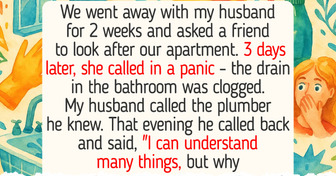
I Refuse to Return to the Office After My Coworker’s ‘Prank’ Revealed His Darkest Secret
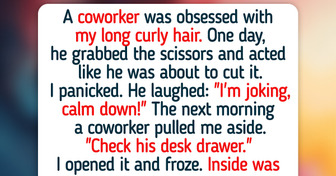
12 Times Kindness Proved to Be the Most Powerful Force of All
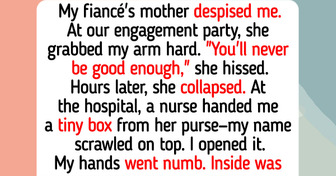
14 Real Moments When Empathy Changed Everything Forever
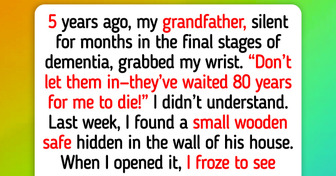
15 Stories That Show Kindness Is a Quiet Language the World Needs
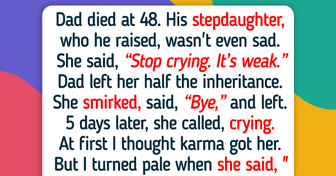
I Quit After My Boss Punished Me for Attending My Mom’s Surgery
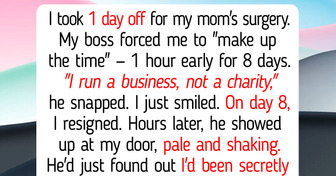
15 Moments That Prove Kindness Is the Thread Holding Life Together
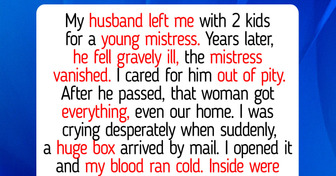
I Refuse to Let My Inheritance Go to Family Members Who See Me as a Personal Bank
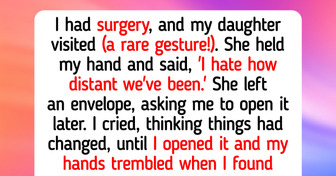
I Refuse to Train a New Hire Who Makes $27K More Than Me Because of Her Master’s Degree
